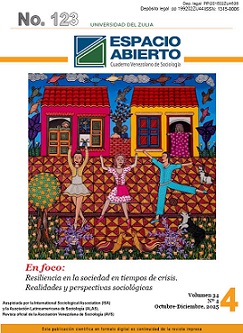Sociologies of Resilience
Abstract
The Global North lineage of the concept resilience has ranged from security studies, and other discussions that focus on individuals becoming responsible for getting through difficult times. The critics have pointed to the ways in which the state and other institutional culpability for creating crises is wiped out through this neo-liberal individual-responsibility focused approach. Even refugees, whose lives devastated by war and other human made conflict, traditionally seen as deserving of humanitarian aid, are being asked to develop resilient, individual-level solutions to the crises that envelop them. Sociologists are also aware of resilience that develops through activism and protests, including shared meaning-making where resilience is an ingredient of resistance. This paper outlines these strands of scholarly conversations. It also looks at the concept of resilience from the perspective of knowledge hierarchies and emphasizes the need to expand our methodologies to become more sensitive to multiple ways in which resilience is expressed around the world without the use of this English-rooted term
Downloads
References
BOURBEAU, Philippe. 2018. A Genealogy of Resilience. I12: 19-35.
CHANDLER, David. 2016. “Debating Neoliberalism: The Exhaustion of the Liberal Problematic.” In The Neoliberal Subject: Resilience, Adaptation and Vulnerability, edited by David Chandler and Julian Reid, 9–16. London: Rowman & Littlefield international.
CLARK, Janine. 2021. Vulnerability, Space and Conflict-Related Sexual Violence: Building Spatial Resilience. Sociology, 55(1): 71-89.
HANAFI, S. 2014. Employment of Palestinian refugee women in Lebanon: Opportunities and Hurdles. Refugee Survey Quarterly. 33 (4):31-49.
HANAFI, Sari. 2012. Flexible citizens, inflexible states. International Migration & Integration (2012) 13:441-458
HANAFI, Sari and LONG, Taylor. 2010. Governance, Governmentalities, and State of Exception in Palestinian Refugee Camps of Lebanon. Jourmal of Rwfugee Studies, 23 (2) 134-159.
KULPA, Roberto And LUDWIN, Katherine. 2020. The Potential of Friendship: A Case for Social Resilience and New Care Objectives. Interalia. HTTPS://DOI.ORG/10.51897/INTERALIA/RGRQ6813
KRUGER, Marco. 2019. Building Instead of Imposing Resilience: Revisting the Relationship between the Relationship Between Resilience and the State. International Political Sociology, 13: 53-67.
LEE, Mandy. 2025. Towards a Conceptual Model of Resilience as Dynamic, Communal and Political: Exploring the Links Between Resilience and resistance in Repressive Social Contexts. Paper presented at the International Sociological Association Forum, Rabat, Morrocco.
NJIRU, Roseanne and PURKAYASTHA, Bandana. 2015. Voices of Internally Displaced Persons in Kenya: A Human Rights Perspective. Kolkata and London: Frontpage Publications.
PATIL, Vrushali and PURKAYASTHA, Bandana. 2018. The transnational assemblage of Indian rape culture, Ethnic and Racial Studies, 41:1952-1970. DOI: 10.1177/0011392117736302
PURKAYASTHA, Bandana. 2025. Distancing as Governance: On Migrants and Contemporary (In)securities.. On the Margins of Protection, edited by Paula Banerjee. Kolkata: Orient Black Swan. Pp 21-49.
………… (2024)Humanitarianism and Human Rights. In Roth, Silke, Purkayastha, Bandana, and Denskus, Tobias (co-edited). Handbook of Humanitarianism and Inequality, Elgar. https://www.e-elgar.com/shop/usd/handbook-on-humanitarianism-and-inequality-9781802206548.html. Pp. 92-107.
…………… (2021) Knowledge hierarchies and feminist dilemmas: Contexts, assemblages, Voices, and Silences. In Producing Inclusive Feminist Knowledge: Positionalities and Discourses in the Global South, edited by Josephine Beoku-Betts and Akosua Adomako Ampofo. Advances in Gender Research series, Emerald Publishing. Pp.23-39.
PAVIĆEVIĆ, Olivera. 2016. Koncept Otpornosti U Sociologiji (The resilience Concept in sociology) DOI: DOI: 10.2298/SOC1603432P
RYAN, Caitlin. 2015. Everyday Resilience as Resistance: Palestinian Women Practicing Sumud. International political sociology, 2015-12, Vol.9 (4), p.299-315
REID, Julien. 2013. Interrogating the Neoliberal Biopolitics of Sustainable Development-Resilience Nexus. International Political Sociology, 7: 353-367.
SIMPSON, Leanne Betamosake. 2017. “Indigenous Resurgence and Co-resistance,” Critical Ethnic Studies 2 (2): 19–34.
SINGH, Priya and BANERJEE, Paula. 2024. Humanitarianism-Development-Peace Nexus. In Roth, Silke, Purkayastha, Bandana, and Denskus, Tobias (co-edited). Handbook of Humanitarianism and Inequality, Elgar. https://www.e-elgar.com/shop/usd/handbook-on-humanitarianism-and-inequality-9781802206548.html
Officials documents;
UNITED NATIONS. (2004) Living with Risk: A Global Review of Disaster Reduction Initiatives. New York: UN Publications.
UNHCR. N.d. UNHCR’s Strategic Directions 2017-2021. https://www.unhcr.org/us/media/unhcrs-strategic-directions-2017-2021

This work is licensed under a Creative Commons Attribution-NonCommercial-ShareAlike 4.0 International License.
Los autores/as que publiquen en esta revista aceptan las siguientes condiciones:
- Los autores/as conservan los derechos de autor y ceden a la revista el derecho de la primera publicación, con el trabajo registrado con la licencia de atribución de CreativeCommons, que permite a terceros utilizar lo publicado siempre que mencionen la autoría del trabajo y a la primera publicación en esta revista.
- Los autores/as pueden realizar otros acuerdos contractuales independientes y adicionales para la distribución no exclusiva de la versión del artículo publicado en esta revista (p. ej., incluirlo en un repositorio institucional o publicarlo en un libro) siempre que indiquen claramente que el trabajo se publicó por primera vez en esta revista.
- Se permite y recomienda a los autores/as a publicar su trabajo en Internet (por ejemplo en páginas institucionales o personales) antes y durante el proceso de revisión y publicación, ya que puede conducir a intercambios productivos y a una mayor y más rápida difusión del trabajo publicado (vea TheEffect of Open Access).

















